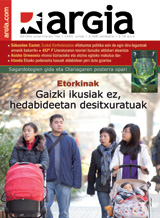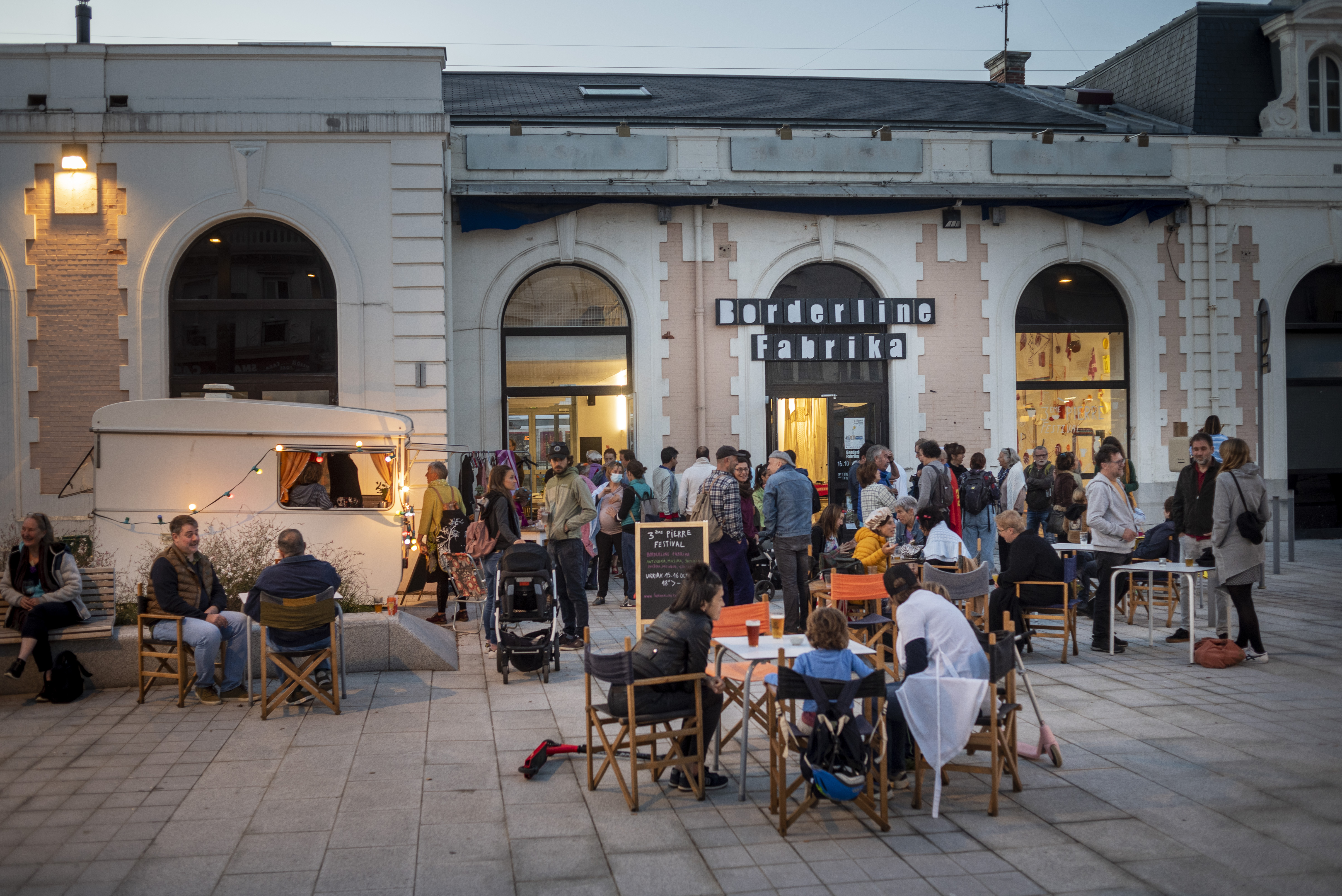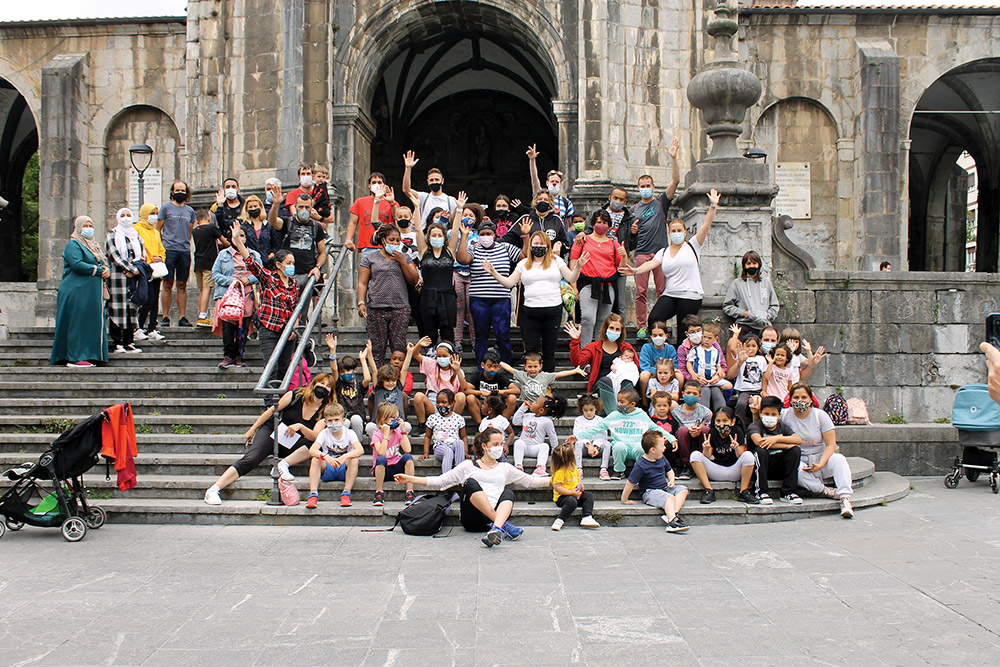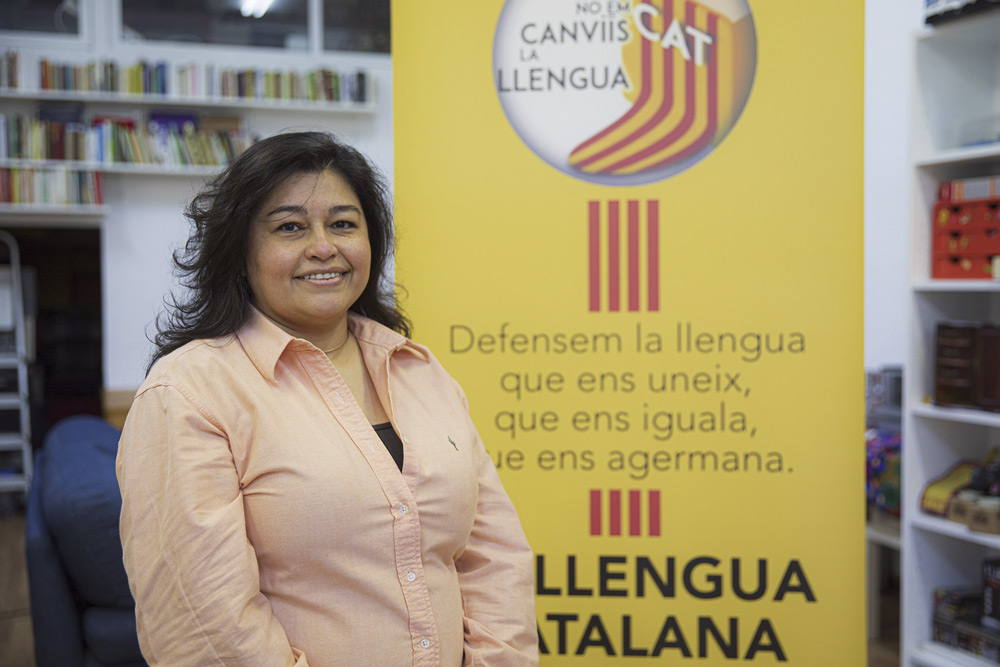Perception varies depending on watchtower
- The concerns caused by the economic crisis, as has happened in other countries, have not sought the income key for foreigners. The data says no, there's no reason to be alarmed if we look at the whole picture. Our perceptions of immigrants are within standards. But it's been racism, but it's not widespread.
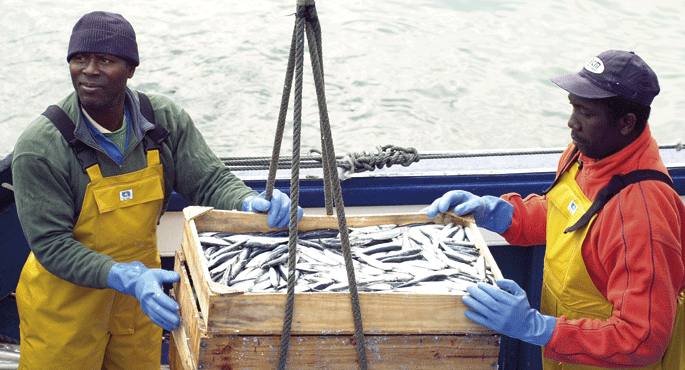
“People will take the guns someday and justice will start to do on their own, if the judges and above all the politicians do not solve not only this serious problem that is destroying the whole of Spain (…) I would like to encourage the residents of that neighborhood not to discourage, against, stop calling the Ertzaines and do everything they do with that rubbish that has come from outside” (November 22, 2011). “I’m a neighbor of Errenteria and it’s true that the neighborhood of Iztieta disgust that chusma that goes. And what does the Ertzaintza… Municipal Police… City Hall…? NOTHING! ! I think this has to end very badly, because people are going to explode. And I hope that those of SOS Racism will be silent and will not defend what is indefensible. Because we who live here see that the problems are created by the Maghreb. No one complains about other people of color living in the same neighborhood, and there are many. Why, SOS Racism?” (Milan83, 24 November 2011). “A week ago I pointed out the degradation that the implementation of the mosque authorized by the PSOE, the installation of announcements, tea shops and similar business covers meant for this neighborhood (...) The neighbours of Iztieta and Errenteria do not have to swallow that poop as a result of what has been called bad Culture of Civilizations” (Imanoldonostia, 22 November 2011). These are comments seen on the website of El Diario Vasco – originals written in Spanish – whose owner of the news that can be read above says: “Residents have denounced that the Iztieta district of Errenteria is a ‘hell’.” The statements of some neighbors have filled the body of the news. They say they don't feel safe, that the climate of crime reigns on the streets in which they live. The article has emerged in the newspaper as a result of a tragic event, in which a man died of a heart attack after a strong discussion at the Extremadura bar in November 2011. But beyond this event, members of the Association of Neighbors of With Us have also pointed out some of the businesses that have opened up in the neighborhood, around which, according to them, situations arise in which the neighborhood sinks: fights, prostitution, robberies, drug trafficking...
The word “immigrant” is not mentioned, not even synonymous in the article, but you just have to look at the tone of the answers that the news has, so that some may find out where and especially where they see the problem. A problem among specific people has placed an entire community in the target of some people and that community is an immigrant, especially Maghreb if the second comment is addressed. This is not the first time that Iztieta has appeared in the press on a matter of this kind. Two years earlier, after an attempt at robbery and rape, the environment mixed up in the same neighborhood of Errenteria, where several neighbors were concentrated for several days in front of the immigrant shops, hundreds of people who were outraged, insulted and assaulted, with a harsh environment.
Crisis times are often conducive to their emergence and growth. It is enough to direct social concern against a sector of society – and not precisely the one that has caused such concern – to begin to see events such as that of Iztieta. But with or without crisis, where less is expected, the sharp, or not so subtle, eye will find the trail of racism. Last March SOS Racism conducted a simple study in several bars in Bilbao: trying to introduce a black, Arab and white couple to the same premises and record the answers given. At Every, black, Moroccan and Latin were allowed to enter. Big Benen to black and Moroccan people. To Weekender's Moroccans. The three: the Moroccans. The crazy bongo: to the Moroccans. St. Peter of Divine Heaven closed the door to the blacks and Moroccans, claiming that God did not, but the local politics demanded it. Galleon: Moroccans and Algerians. The Otxoa: they all entered for free, except for the Moroccans, they were asked to pay them the entrance. All those who were only able to enter Charol, in the ninth bar, where they discriminate only by sex, pay the men, the women don't.
Data on the perception of immigrants
These cases are of concern, but to what extent are these attitudes spread in the Basque Country? Is there any reason to think that racism is booming? We address the Social Affairs Observatory Ikuspegi@k with the intention of writing in more detail. The 2010 Yearbook on Immigration in the CAV has recently been published and data have been provided to spend the underlining that two years ago the number of people from abroad began to decrease, and last year this downward trend continued. This is the first time in the last five years and it points to the economic crisis as one of the factors that have led to this decline.
Despite the figures, the sociology professor at UPV/EHU Gorka Moreno referred to the perceptions of immigrants. It has coordinated, together with Xabier Aierdi, the report on immigration in Araba, Bizkaia and Gipuzkoa. One of the many data offered by this intense work is that 15.4% of the population considers immigration to be a problem. A troubling percentage? “No, the truth is that these kinds of surveys are also done in the Spanish state and the data are similar.” CAV numbers are also better, according to Moreno. He explained that these perceptions can be produced by several factors, such as the number of immigrants living in one place or the impact of the economic crisis in that place. And, in this sense, Hego Euskal Herria is not as serious as many areas of the Spanish State at the moment. “With the crisis we detected that in 2010 the data worsened, but in the 2011 barometer that we will publish shortly it is found that they have improved compared to 2010.”
Functionalist vision
Another conclusion to be drawn from the report would be the phrase “come, but work”. The immigrant population has been and continues to be valued primarily for their capacity to need; 44.9 per cent of the population believes that it is necessary to work in different sectors and many (47.1 per cent) believe that the jobs carried out by foreigners are the ones that the locals do not want to do. “Another question is to see which immigrants should have a residence permit. Answer: people in employment. Most respondents do not care about the rest, they can stay with us if they have a job. However, I do not find that worrying either – says Moreno –, many times the functionalist approach – linked to the labour market – and based on human rights, but immigrants come to work here, and here there are job opportunities. In this sense, it seems to me absolutely normal that this functional element is internalized and sometimes will be used; in short, if the CAPV wants to maintain the level of well-being it has, from a demographic point of view, immigrants are essential”.
The issue of jobs is important in determining the attitude of citizens. To explain briefly, the closer the economic situation of those born of immigrants, the worse the perception of foreigners. Those who have precarious jobs, those who are unemployed, those who receive social aid -- they appear in research among those who see the most disadvantaged immigrants. Moreno states that for these groups immigrants are competitors, because they are in the same stratum as society, “and conversely, it is very evident, and it is no coincidence that the opinion of the immigrants among the middle classes is positive. Why? Because for the middle classes, immigrants have only advantages: at the same time that many middle-class women enter the labor market, immigrants have filled the house void for very little money; besides, in the face of the labor market they are not at all competition; therefore, it is very easy to use an unequivocal discourse, because immigrants only bring them advantages”. For the other part, Moreno states that immigrants are an objective problem: if immigrants do precarious jobs, those who are born there have fewer opportunities.
Data vs. stories
Although the research does not give cause for concern, the alarms of the common press reader are turned on more than once in view of how the issue of immigrants is dealt with, and especially thinking about how it can distort people’s vision. We started the report citing the case of Iztieta, and it is no wonder that in that conflict some media outlets have done their work of incendiary. The City of Errenteria itself had to ask the media to act wisely. These were not excessive demands: to check the sources and to deal with the issue from all points of view, without simplifying the facts; what any journalist should do, not only with thorny issues, but with anyone. But the newspapers are there to prove that it's done in insufficiency.
Moreno explains that there is another problem. “A journalist working on these issues told me: ‘We don’t want data, we want stories.’ In other words, newspapers have to be sold and harmonious coexistence does not help much in this. “That the dog bites the child is not news, but that the child bites the dog,” points out one of the maxims of journalism. We look for the unusual, the abnormal to write articles, but there are always limits that cannot be overcome or that should not be overcome. In the case of immigrants, one of them is to relate foreign origin to crimes. Perhaps not directly, saying that “those who come from X countries steal”, but when reporting crimes, it signals the origin of the offender and implicitly, beyond the person who has committed the crime, it signals to the whole community. "The role of the media can be dangerous if the abnormal is considered normal or if the minority is given by a majority. That, of course, has a direct impact on public opinion.” He believes that you can and do other kinds of journalism. “Because if you want stories, you can also sell positive things about immigration, it’s being done in different media, like the life of a woman who has come from Colombia or Ecuador, and how she cares for our older people. You can demonstrate how hard your life is, how useful and how necessary they are...”.
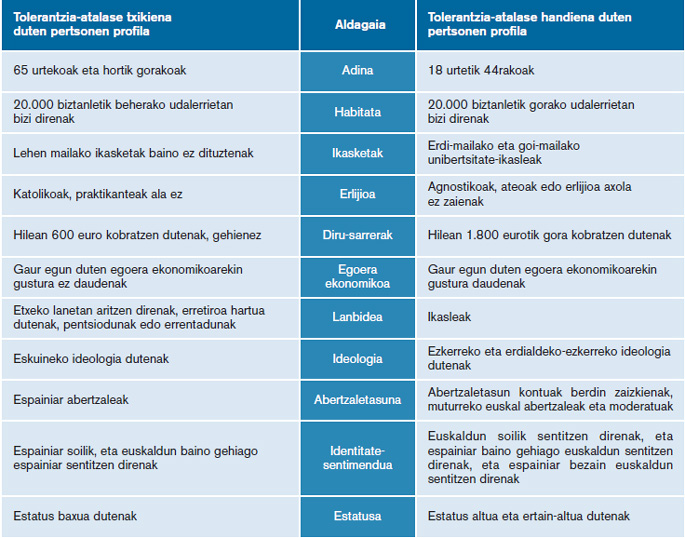
The above table has been extracted from the 2010 Yearbook on Immigration prepared by the Social Affairs Observatory Ikuspegi@k. It measures the threshold of tolerance towards immigrants based on different factors, showing both extremes. Although these factors do not determine anything, studies conducted in recent years show that they are at least significant.
Gizakiok berezkoa dugu parte garela sentitzeko beharra. Parte izateko modu hori jasotako hezkuntza, ingurua... formateatzen joaten da.
Identitateak ezinegon asko sortzen du gizakiongan. Batzuetan, banaketak ere eragiten ditu, ezin dugulako jasan beste baten identitatearen... [+]
International Migrants Day is celebrated on 18 December. Last year, an institutional event was held at the Alhóndiga in Bilbao in cooperation with the social partners and I was invited to participate. There I had an unbeatable opportunity to meet new creators and, above all, to... [+]
Dorleta Mikeok esango digu elkarrekin baina nahastu gabe bizi garela, ez dagoela bizikidetzarik bertakoen eta beste jatorri batzuetatik etorritako familien artean. Mikeo eta Lola Boluda Donostiako Egia auzoan, Aitor ikastolako jolastokian, abiaburua izan zuen egitasmoa garatzen... [+]
The current Basque society is culturally very diverse, people from different backgrounds live in the municipalities, and our centers have noticed this cultural diversity, as in recent courses the enrolment of foreign students has increased considerably. According to the latest... [+]
Rosario Palomino Liman (Peru) jaio zen eta 30 urtetik gora daramatza Bartzelonan bizitzen. Katalanez erraz egiten du, eta hala ere, katalan hiztunek gaztelaniaz egiten diote, kanpotar itxura duelako. Badaki errespetuaren izenean egiten diotela gaztelaniaz, baina bera... [+]
But the rain has come at the end: How to hold Euskal Herria so green, if not,” they say. And he really has it. But in our mother's country, the earth acquires a dark tile color when it rains, as if it wasn't very clear what it's made of: tiles by land or tiles. Green meadows are... [+]
Serious situation? To whom is the extremely serious situation addressed? Who cares? If the 2018 studies, studies and surveys show that the Basque lives behind his culture, who cares?
My friend told me what it's hard to get together, at dawn, when we were in Azpeitia Square... [+]









